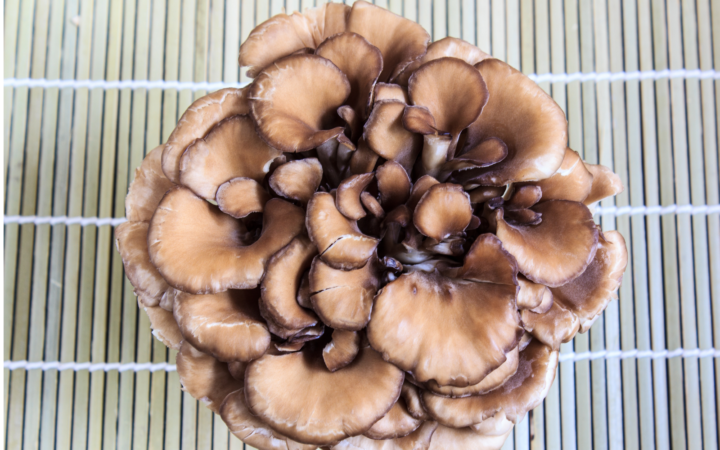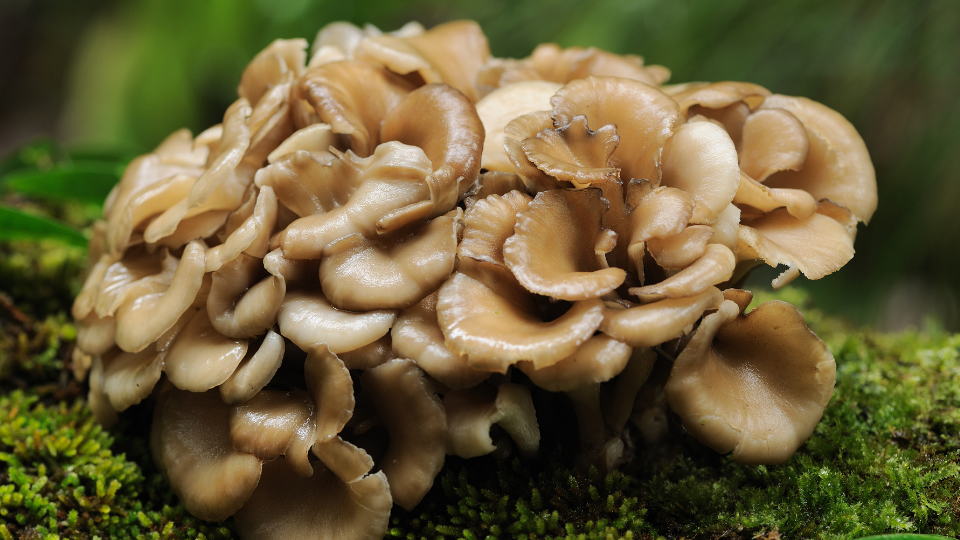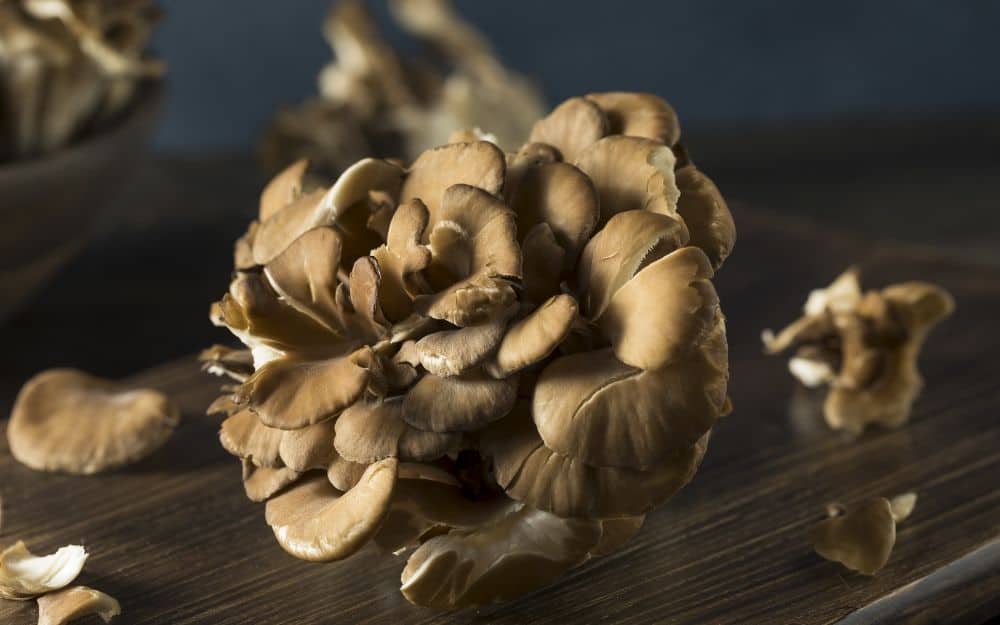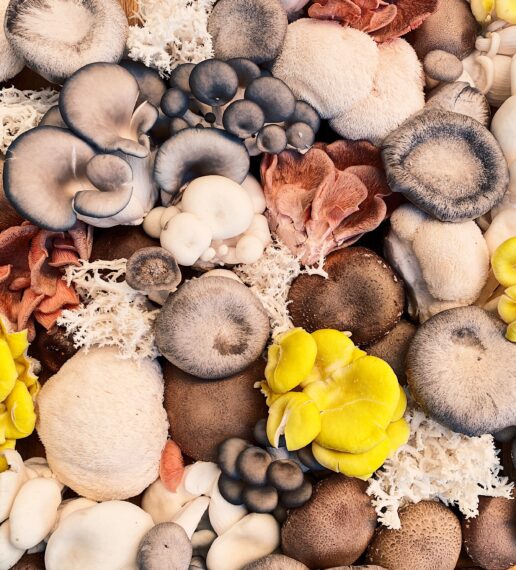Health Benefits of Maitake: What You Need to Know About This Medicinal Mushroom

If you’ve done any research about the health benefits of mushrooms, chances are you’ve come across maitake.
Like all other edible mushrooms such as shiitake, turkey tail, reishi, and lion’s mane, maitake mushroom offers many potential health benefits thanks to its high concentration of antioxidants, micronutrients, and other beneficial compounds including complex sugars (aka polysaccharides) called beta-glucans.
Along with being a tasty, eye-catching ingredient for recipes, maitake is considered a medicinal mushroom or adaptogenic mushroom, which means it can help the body adapt to stress and function normally.
Maitake mushroom has been used in traditional Chinese and Japanese medicine for centuries, and it’s also been used as a supplementary treatment for cancer patients in China and Japan for more than 30 years. (1)
However, it’s only in recent decades that Western culture has taken notice of this ancient remedy. Read on to learn more about the health benefits of maitake mushroom and how including more of this fantastic fungi in your diet can help you.
What is Maitake Mushroom?
Its scientific name is Grifola frondosa, but you probably know maitake (pronounced my-tah-keh) by its other more common names: hen-of-the-woods, cloud mushroom, dancing mushroom, king of mushrooms, ram’s head, and sheep’s head.
Native to areas of Japan, China, and North America where it grows wild at the foot of oak, elm, and maple trees, maitake mushrooms can be distinguished by their striking appearance—unlike many mushrooms that grow individually, maitakes grow in clusters, which look like giant pine cones or blooming bouquets of brown, beige, and gray blossoms.
Nutrition of Maitake Mushroom
One cup of diced maitake mushroom has just 25 calories, no cholesterol, less than one gram of fat, one gram of sodium, 1.4 grams of protein, and almost two grams of dietary fiber. (2)
What’s more, maitake has 143 grams of potassium (4% of the daily recommended value) and a whopping 196% of the daily recommended value of vitamin D, which is important for strong, healthy bones and overall health. (3)
It also has a good amount of B vitamins including niacin, riboflavin, and folate.
7 Health Benefits of Maitake Mushrooms
One of the most noteworthy aspects of maitake mushrooms is its high concentration of beta-glucans, which are complex sugars (polysaccharides) found in the cell walls of certain plants, yeast, algae, and fungi (hello, mushrooms!).
Among these powerful beta-glucans is D-fraction, a maitake extract that has been shown to have therapeutic effects for cancer patients. (4)
As with many natural remedies, more scientific studies are needed on the health benefits of maitake mushroom. Even so, the evidence is mounting on how this functional mushroom is helping people today. Below are some of the most researched health benefits tied to maitake mushroom.
1. Boosts Immune Function
A strong immune system is essential for overall health—it helps ward off everything from the common cold to more serious diseases. Multiple studies have demonstrated that maitake mushroom stimulates immune response. (5)
In a 2014 study, researchers found that maitake-derived glucans behave “via the same mechanisms as other highly active glucans to strongly stimulate immune defense reactions” and are even more active when combined with glucans from shiitake mushroom. (6)
2. mAY Kill Cancer Cells
There have been some promising findings when it comes to maitake and its role in fighting cancer. As mentioned, it’s long been approved in Japan and China as an adjunct to standard medical treatment for cancer patients. (1)
Maitake is thought to activate certain cells that attack cancer, including macrophages, T-cells, and natural killer cells.
One study in 2013 found that maitake d-fraction suppressed the growth of breast cancer cells (7), while other research indicates that combining maitake D-fraction with vitamin C can be a possible alternative approach for cancer therapy. (8)
3. Can Help Balance Blood Sugar
Keeping glucose levels in balance is important for everyone to sustain good health, but it’s particularly crucial for diabetics. Studies going as far back as 1994 show the anti-diabetic effects of maitake extract. (9)
A 2001 study concluded that the fruiting body of maitake can improve blood glucose levels (10), while two studies published in 2015 found that maitake alleviated the symptoms of rats with Type 2 diabetes and improved insulin resistance, respectively. (11, 12)
4. Lowers Cholesterol Levels
Keeping your cholesterol in check is a must for heart health and maitake mushroom could be one way to help keep you on track. In a four-week test conducted on mice, freeze-dried maitake extract was found to lower cholesterol levels. (13) This is promising for future human clinical trials as high cholesterol is linked to coronary heart disease.
5. Reduces Blood Pressure
Uncontrolled high blood pressure can lead to stroke by damaging and weakening your brain’s blood vessels and your arteries (14), but adding maitake to your diet could help stabilize your blood pressure.
In a 2010 animal study published in the International Journal of Medical Sciences, maitake was shown to lower blood pressure as well as enhance insulin sensitivity and reduce aspects of inflammation. (15) Similarly, an earlier study found that maitake was able to improve hypertension in rats over an eight-week period. (16)
6. Has Anti-Tumor Effects
Research has shown that maitake d-fraction enhances antitumor effects and reduces immune system suppression in mice and “can provide a potential clinical benefit for patients with cancer.” (17)
Furthermore, a human study in 2013 found that oral administration of maitake d-fraction spurred immune function and provided tumor-fighting effects for cancer patients. (18)
7. May Improve PCOS & Fertility
Polycystic ovary syndrome (PCOS) is when the ovaries overproduce male hormones, which creates small ovarian cysts.
This health condition affects an estimated 5 million women and is one of the leading causes of infertility. (19)
While more studies are needed, there are some promising findings that maitake can induce ovulation in PCOS patients and may be useful as an adjunct therapy for women who failed with clomiphene citrate treatment.(20)
How To Consume Maitake
You can buy fresh, whole maitake mushroom and dried maitake at many grocery stores and health food markets. Fresh maitake is usually in plastic packaging, but you can store it in a paper bag and keep it in the refrigerator to extend its shelf life.
Like other mushrooms, you can sauté, fry, roast, grill, or add maitake to any dish—they add meaty texture and an earthy flavor to pizza, stir-fries, pastas, sandwiches, and soup.
Maitake mushroom extract may also be taken as a supplement in powder form, capsules, or liquid concentrate. Look for trusted brands with organic maitake and be sure to avoid any fillers and artificial ingredients.
Because supplements aren’t regulated by the FDA, there is no dosage set in stone. Talk to your healthcare professional to determine the correct dosage, and remember that taking maitake with vitamin C and shiitake could amplify its benefits. (6, 8)
Side Effects of Maitake
Maitake has been used for centuries in cultures for years, and is generally considered safe.
If you’re pregnant or breast-feeding, or if you’re taking a blood thinner such as warfarin or medications to lower blood sugar or blood pressure, maitake could produce adverse effects.
Always seek the medical advice of your healthcare provider before changing your diet or taking any dietary supplements.

The Magic Of Maitake
Whether you know it as hen-of-the-woods on restaurant menus or as maitake d-fraction supplements, the bottom line is that there are many health benefits of maitake. It’s a low-calorie, low-sodium, no-cholesterol food loaded with antioxidants, vitamins, minerals, and immune-boosting beta-glucans.
So go ahead and try some maitake in your next recipe or smoothie (use powdered extract for that, of course) and discover the power of this medicinal mushroom that not only tastes great, but can help your health in more ways than one.

